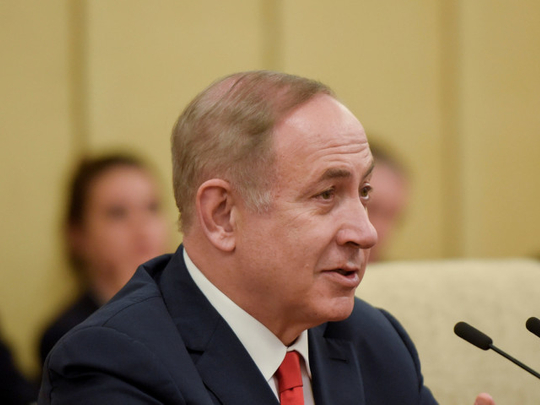
Israel’s policy draws upon its substitution/expansionist designs that seek to annex the largest possible area of Palestine and dispose of the biggest number of its people. When being extremely ‘generous’, the Israeli far-right ruling coalition would propose establishment of a rubber-stamp Palestinian state, having the image of an ‘ailing homeland’, i.e. a Palestinian authority in the West bank devoid of power and sufficient geography, while maintaining to Israel a state of ‘convenient occupation’ that would see expansion/annexation of Jewish colonial (“settlement”) blocs and construction of new ones. Such plots would include maintaining the blockade imposed on Gaza Strip along with other punitive measures.
When such an ‘ailing homeland’ is created, the Zionist state may fear its ‘existence’ or ‘recovery’ and seek to expel its citizens within the notion of an alternative homeland or merely consider Jordan to be the Palestinian state because of the presence of a Palestinian “majority” on the eastern side of the River Jordan — a proposal rejected both by Jordan and Palestine. It is worth noting that such an alternative homeland is not restricted to Jordan but goes beyond that to settling Palestinian refugees in countries where they currently reside (such as Syria and Lebanon). Recently, there have been Israeli voices calling for an ‘alternative homeland’ to the Palestinians in Sinai Peninsula.
The idea of an alternative homeland is linked to the recognition of Israel as a “Jewish state” as well as to the goals of the racist separation wall that it is still building. They are all part of Israeli ready-to-implement designs, the most “extremist” of which is ethnic cleansing and deportation of Arabs from the occupied lands when time permits. Such designs run parallel to an expedited Judaisation process that is going on within the Zionist colonialist and expansionist strategy throughout its history based on two fundamentals: Requiring seizure of the Palestinian land after emptying it by massacres and terrorism or by means of economic policies that would make Palestine a land ‘repelling’ its native population.
United States President Donald Trump has called on the Israeli and Palestinian sides to choose the solution they deem suitable in “cooperation and coordination” with some Arab states. But a serious debate is going on in Israel on proposed solutions, mostly focusing on mere Palestinian self-rule. The Israeli Prime Minister, Benjamin Netanyahu, wants a self-rule in the form of a ‘deficient’ state, repeating his preconditions for recognition of Israel as a Jewish state and for security control of all Palestinian lands west of Jordan River. He claims he wants the Palestinians “to be free in a self-rule without being able to pose a threat to Israel”. Isaac Hertzog, the opposition Labor party leader, who we are told is a “moderate”, is proposing an interim Palestinian state devoid of any sovereignty. This proposal was outlined in an article in the Israeli daily Haaretz, where he proposed that Israel be recognised as a Jewish state with colonist blocs maintained, along with a demilitarised Palestinian state that is still under occupation. His proposal also seeks increased cooperation with Arab states in the region, especially in security and economic domains, completing construction of the Separation (apartheid) Wall and the one surrounding occupied Jerusalem, with nearby Palestinian villages isolated.
Israel’s President Reuven Rivlin, who usually tries to appear with a political stand different from that of his rightist Likud party, has declared his support for the “annexation of all occupied areas to Israel”. He says he is convinced that “all of historical Palestine is a property of the Jews and the sole authority in those areas should remain in the hands of the government of Israel”. Another plan was proposed by Naftali Bennett, leader of the right-wing Jewish Home party and the main rival of Netanyahu and his Likud party. Bennett offered granting “self-rule” to 40 per cent of the West Bank, but remains linked to the Zionist state, and annexing to it the remaining 60 per cent of the land. His plan also includes pushing Gaza Strip to establish “an independent Palestinian state”. Bennett proposes enhancing the “desired’ self-rule with an economic recovery programme in the West Bank similar to the US Marshall Plan initiative extended to Europe in the wake of Second World War. Occupied Jerusalem is to be excluded, because in his view, the city will be the capital of the Zionist state. It is also important to refer, in this context, to a plan suggested by the Israeli Defence Minister, Avigdor Lieberman, based on “a land exchange” plan that involves annexation of the Jewish colonies in return for a transfer of the Triangle (a concentration of Palestinian towns in Israel) to the Palestinian “state”, or the self-rule areas.
The ‘alternative homeland’ appears as the ultimate and perfect option for Israel to get rid of the Palestinian state, taking advantage of a situation where the US appears to be backing out of its historic position on the two-state solution. Such an option also appears favourable in light of the current regional conditions lacking Arab and Muslim support to the Palestinians in addition to a decline in the current status of Europe that has for long advocated the establishment of a Palestinian state. Yair Sheleg, a researcher in Israel Democracy Institute, wrote under the title, Only the Jordanian Option: No to Annexation, No to Two States, saying such an option (the alternative homeland) should be revived. He added: “If the American president and many others in the West, who now realise the risks they face from unstable Arab countries, are convinced that this would be the best solution, then with the tools they have and the use of the carrot-and-stick approach, they can convince Jordan to move in the desired direction.”
Professor As’ad Abdul Rahman is the chairman of the Palestinian Encyclopaedia.










